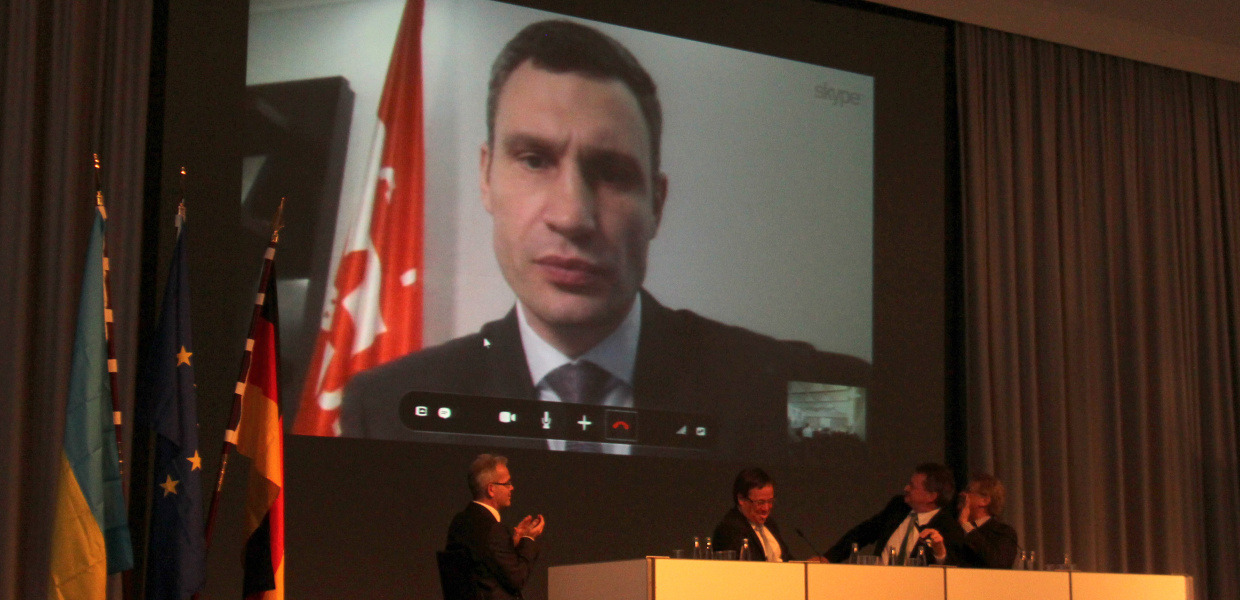Ukrainian presidential candidate Vitali Klitschko condemned the events unfolding on the Crimean peninsula as "an incredible act of aggression on the part of Russia." It's a case of "breaking and entering," he said, speaking during the Europe Forum, a conference organized by the Bertelsmann Stiftung and the Konrad Adenauer Foundation.
The well-known spokesman for the Ukrainian opposition had been invited to participate in the event a few months earlier, when demonstrations had just begun in Independence Square in Kiev. At the time, no one suspected he would soon be a presidential candidate or that the country would be facing its current upheaval. At the last minute, events in Crimea prevented Klitschko from participating in person, as originally planned.
At the moment, our country is the most chaotic country in the world, which is why we urgently need reforms
Klitschko denied reports that there had been violent conflicts between Crimea's Russian majority and its Ukrainian minority. "I want to stress that there is no conflict between the people living there," he said. (Link to his complete remarks, in German) While speaking, Klitschko appeared tense and somber. He repeatedly thanked the EU for its efforts during the conflict in Ukraine, which has been unfolding for over three months. At the same time, he appealed to western nations to continue their assistance and support Ukraine as it tries to establish a stable political and economic framework. "That means the conflict with Russia has to be solved peacefully, so that stability in the entire region is not threatened. In addition, we have to overcome the consequences of Yanukovych's time in office." Klitschko said. "At the moment, our country is the most chaotic country in the world, which is why we urgently need reforms."
According to Elmar Brok, chairman of the European Parliament's Foreign Affairs Committee, no solution to the conflict will be possible without Russia, and it is therefore necessary to return to the source of the problem, the association treaty and trade agreement with the EU. "We are taking Russia's concerns very seriously, but at the same time must clearly state that they are unfounded. Ukraine will continue to produce products for the Russian market and will remain an important trading partner for Russia," Brok said.
In terms of providing financial assistance to the country, Richard Böger, chairman of the Executive Board of Bank für Kirche und Caritas, a Paderborn-based credit union, warned against assuming Ukraine's debt, which currently amounts to some €20 billion. "The better solution would be an orderly bankruptcy and the creation of new structures, which will be expensive enough," he said. "Even if it costs a few euros in coming weeks, we need to support Ukraine so that it can overcome the current situation. World history is currently being made and the global equilibrium is endangered."
For Armin Laschet, former Member of the European Parliament, who spoke at the gathering about the EU's Neighbourhood Policy, the most important thing is that Russia does not continue to feel threatened. "We are on very thin ice," he warned. "What we need in the current phase are cool heads and good ideas. In addition, we have to let Ukrainians know they are not alone." The EU must also make clear that Russia's behavior is unacceptable, and that every country is free to make its own decisions when it comes to recognizing territorial integrity, Brok added.




